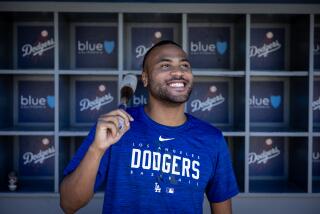Budding Young Athlete Has Special Feeling for Abbott
- Share via
SEOUL — Fingers and toes.
Parents count them within the first few seconds of their child’s life, an anxious inventory. I remember the feeling of panic at the birth of my son, now 4, when I thought I counted six toes on one foot. I remember the relief when my recount came up with the more traditional number.
When Randy Sobek was born 5 1/2 years ago, the initial inventory was fine, except that the four fingers on his left hand were pale. Somehow he had been pressing on them wrong in the womb. It was like your hand going to sleep, only Randy’s left hand never woke up.
When he was 3 days old, doctors amputated the four fingers and part of his thumb. He spent the first 3 weeks of his life in the hospital.
Since then, Randy has undergone nine major operations, mostly skin grafts on the forearm. One, though, was an attempt to implant the second toe of his left foot onto his hand, opposite the partial thumb. That operation was unsuccessful, so Randy now has nine toes.
Randy was one of the more interested TV viewers when Jim Abbott pitched for the U.S. baseball team to open the medal round of the Olympic Games. Abbott, like Randy, has an unmatched set of arms, having been born with a right one that ends about halfway between his elbow and where his wrist would be.
Randy and Jim, who have never met, have a lot in common. Both are multi-sport athletes who specialize in baseball pitching, and both are entering big new stages of life where public attention is drawn to their alleged handicaps.
Abbott is pitching in the Olympics and has signed with the California Angels, and Randy has started kindergarten.
Both guys got where they are today with some solid help from their parents.
“My parents had everything to do with my being here in the Olympics,” Abbott said last week after having struck out 7 batters in 3 innings in a game against Canada. “From early on, they encouraged me to do everything. If they had told me ‘No, we don’t think you can play ball,’ I wouldn’t be playing. That’s one of the big things about me being here, is giving pride back to my parents.”
How many Jim Abbotts never even picked up a ball or a glove because they were taught from infancy that they were handicapped?
“You play the poor-me game for about 1 day,” says Carol Sobek, Randy’s mother, a guidance counselor for San Diego schools. “Our doctor, Dr. David Subin, whose son has cystic fibrosis, told us, ‘Randy will become how you treat him.’ ”
Mom and Dad treated Randy like a kid. They told him he was lucky, that he had a special arm. Duke Sobek, vice president of the San Diego-based Atlas Hotels, is a former college athlete and he encouraged Randy to play all sports.
But encouragement from home can do only so much. Randy’s athletic career and self-image got a major boost a year ago when the Sobeks were watching TV and saw a report on a college baseball pitcher named Jim Abbott.
Randy snapped to attention, his eyes got wide.
“Daddy!” he said. “That boy has a special hand, just like me!”
The Sobeks watched, fascinated, as Abbott caught the ball with the glove on his left hand, then with a move so quick and fluid that it requires slo-mo replay to see, transferred the glove to the stump of his right arm and the ball to his now-bare left hand.
“Randy was enthralled,” Carol says. “That was the most exciting thing in his world. Every time Jim Abbott is on TV, we videotape it. We keep the tape right by the TV and Randy watches it all the time, for inspiration.
“He has always loved to run and throw the ball, but now he has seen how he can really play baseball. The Abbott system is the thing that has finally excited Randy. Daily, that continues to be a source of inspiration.”
Randy remembers the first time he saw Abbott on TV.
“I was happy because he has a special hand, too,” Randy says. “I want to field just like he does when I play baseball or T-ball. I practice with my daddy a lot.”
It’s a longshot that Randy will ever become a Jim Abbott-caliber athlete. Abbott was a star quarterback, basketball forward and baseball pitcher in high school. Pitching at Michigan, he won last year’s Sullivan Award, given to the nation’s best amateur athlete.
Jim’s athletic limitations have always been in other people’s imaginations.
“I started playing ball at 4 or 5,” Abbott says. “And if there were times I got frustrated, it was because I wasn’t doing something I knew I could do, not because there was something I couldn’t do.”
Abbott is incredibly patient with the public curiosity about his arm. He answers the same questions over and over, but the truth is that he has no concept of what it would be like to play sports with a handicap. To him, playing baseball with one hand instead of two is as real a handicap as trying to write a sports column with green eyes instead of blue.
“I try not to dwell on the disability,” he says. “I don’t believe in it too much.”
Randy may have even less cause to dwell on what some might consider a disability. Last summer the Sobeks learned of a program in Houston, called “Loving Arms.” Children such as Randy are fitted with mioelectric hands that open and close on conscious nerve impulses from the forearm.
Randy is one of about 70 children who have been fitted for the arm. It’s expensive--about $15,000, but covered by most health insurance plans--and requires intensive training, but has been 100% successful.
Randy prefers to play baseball without the hand, like Abbott. And the new hand does necessitate some social adjustment.
“Randy started kindergarten last week,” says Carol, who has taken a year’s leave of absence to help Randy get started in school. “The first day, a couple of girls seemed bothered by his hand. Randy and I went to class the next day and talked to the class. We explained in detail why Randy has the hand and how it works. We passed the hand around and let everyone see it.
“One mother came up to me the next day and thanked me. She said her little girl had been afraid of Randy, but now he was her hero.”
Randy’s hero, meanwhile, walks around the Olympic Village like a wide-eyed tourist, ogling the stars.
“You go down to eat in the cafeteria and every day you see a Biondi or a Steffi Graff,” Abbott says, clearly impressed. “I had my picture taken with Gabriela Sabatini and that was real nice.”
Last Monday, when Abbott turned 21, Pam Shriver saw him in the village and called out, “Happy Birthday.” His teammates are still trying to figure out how she knew.
Since you never know what star you might run into in the village, Abbott always carries his camera. Taking pictures is one of the few things he does differently from most people. He holds the camera crooked in his left hand, upside down.
“People see me do that and they say, ‘Hey, you gotta turn it around,’ ” Abbott says with a laugh. “They don’t realize the pictures come out the same.”
More to Read
Go beyond the scoreboard
Get the latest on L.A.'s teams in the daily Sports Report newsletter.
You may occasionally receive promotional content from the Los Angeles Times.










